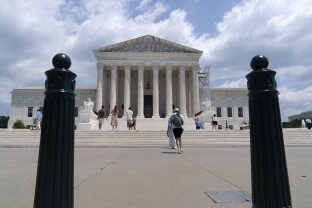When the Department of Health and Human Services tried to claw back more than $10 billion in public health grants earlier this year, 20 blue-state attorneys general sued by pointing to the “major questions doctrine,” a Supreme Court precedent Democrats have otherwise lambasted and conservatives have long embraced.
The strategy worked, at least temporarily. A district judge issued an injunction siding with the states in mid-May, pointing, in part, to the major questions doctrine argument.
The precedent — which limits the power of executive branch agencies and was regularly used by the right against former President Joe Biden — was affirmed by the Supreme Court in West Virginia v. Environmental Protection Agency in 2022. It was strengthened by last year’s Loper Bright decision, which severely hampered an agency’s ability to interpret ambiguous laws.
Both Supreme Court rulings were massive wins for the conservative legal movement and were, in large part, thanks to a court packed with Donald Trump’s nominees. Now, Democrats see the legal landscape Trump paved in his first term as a weapon they can try to exploit against him.
“With these right-wing doctrines, it’s as far as they want to go; it doesn’t depend on anything the left does,” Craig Green, an administrative law professor at Temple University, told NOTUS. “This is the argument that an attorney general might use to say, ‘We gotta use what we can.’ You go to war with the tools you have, not the tools you want.”
The HHS injunction is an early indication of a coming “showdown,” as Green described it, between the conservative legal movement and a Trump administration eager to wield executive power — especially as Congress continues to struggle with getting a legislative agenda through.
It’s a rift that was also on display in Trump’s spat with conservative legal activist Leonard Leo, whom he blamed for a court loss on his tariff proposals.
“In the first term, Trump was basically outsourcing both his judicial appointments and his policy agenda to old school conservatives and Republicans,” Reed Shaw, policy counsel at the progressive legal nonprofit Governing for Impact, told NOTUS.
“In the second term, Trump and MAGA actually have a policy perspective that they’re trying to implement — which will require a higher level of deference to the executive branch than this judiciary might be willing to give him,” he added.
Seeing an opening, Shaw’s organization has been pushing Democratic legal groups and attorneys general to use conservative legal precedents against Trump for months.
“Deploy the MQD wherever plausible,” the organization wrote in a December memo. “Litigants should not allow legitimate skepticism about the doctrine’s provenance, general anti-regulatory bias, or track record stand in the way of doing so.”
Using the tools of the right to challenge Trump is not without its risks, some legal scholars warn.
“Every use of these doctrines makes them more real, makes them have to do with a wider scope and makes them more politically legitimate,” Green said, arguing that conservative justices “would love to” be able to cite a left-leaning example upholding the doctrine.
Conservatives indeed were quick to celebrate California Governor Gavin Newsom’s use of the major questions doctrine in his lawsuit against Trump over his tariff proposals.
“It is especially welcoming to see Democrats such as Newsom, who celebrated unlimited executive power when former President Joe Biden was in office, embrace the Supreme Court’s limitations of those powers now that Trump is president,” Washington Examiner editor Conn Carrol wrote.
The California attorney general’s office told NOTUS it “cannot comment on legal strategy.” The Democratic Attorneys General Association also declined to comment, noting it’s not involved in legal strategy.
Legal scholars on the left say the extent to which Trump-appointed judges will use conservative legal theories against him is still largely unanswered, as the early test cases from Democratic attorneys general haven’t yet hit the highest courts.
“In the lower courts, it seems like it’s just very unpredictable how they’ll apply the doctrine, so I think there’s a good chance of doing it successfully there,” University of California, Berkeley, legal scholar Daniel Farber told NOTUS. He also proposed the strategy of using the major questions doctrine against Trump before he took office.
The HHS funding case, for example, was a decision issued by a Barack Obama-appointed district judge. It remains to be seen whether a higher, conservative judge will rule the same way. Fourteen Democratic attorneys general also pointed to the major questions doctrine in a challenge against Elon Musk. That case is also ongoing.
“We just don’t know where the Supreme Court will end up going,” Farber said. “But I think we should put them on the spot and ask them if they only support this when it’s applied against Democratic presidents.”
—
Claire Heddles is a NOTUS reporter and an Allbritton Journalism Institute fellow.
Sign in
Log into your free account with your email. Don’t have one?
Check your email for a one-time code.
We sent a 4-digit code to . Enter the pin to confirm your account.
New code will be available in 1:00
Let’s try this again.
We encountered an error with the passcode sent to . Please reenter your email.


